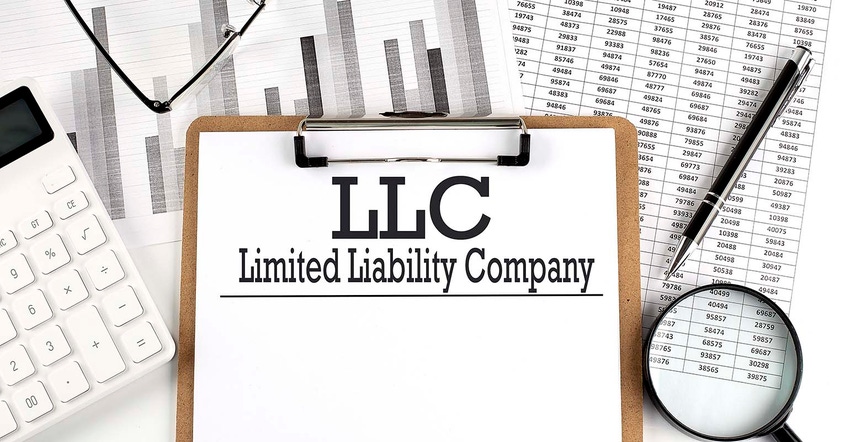
I’m often asked if it's time for a family farm to create an entity such as an LLC. There are several ways you can choose to structure the ownership of your farm operation, ranging from a sole-proprietorship, general partnership, or corporation. More and more farms are now using a limited liability company (LLC) as a business entity which has become popular in the industry for several reasons.
For one, they are relatively simple to establish, require less annual administration, and have the flexibility to be taxed as a sole proprietorship, partnership, or corporation. It is also easier to restructure or unwind an LLC later in time.
Why do you think you need an LLC?
If it’s just for liability reasons, or because your neighbors have one, then maybe you don’t have a strong reason for one. Let’s discuss some of the reasons why:
Liability protection – Since an LLC is a separate legal entity, the owners typically have no personal liability protection from the risks which may occur outside the entity or from creditors of the other members. Be careful, however, if your only reason to form an LLC is for liability protection. You may not be as protected as you think. This is especially of concern if you simply form a single-member LLC and you are the primary operator of the farm. If you are the sole operator, you may still hold personal liability even with an LLC.
I have also worked with operations that have multiple LLCs for each enterprise of their farm. If this is the case, be certain your “T’s” are crossed and “I’s” dotted. Work with your insurance advisor to make sure the ownership of your insurance is handled properly. Work with your tax and legal advisors to make sure the wages being paid out are handled properly. Good litigation attorneys thrive at finding a way to “pierce through your corporate armor.”
Taxation – An LLC does not pay income tax itself; as it flows through to the individual owners. In some cases, a land LLC provides self-employment tax savings from self-rental deductions. These can be significant for a retiring farmer who has less expenses to offset income. An LLC taxed as a partnership also preserves a step-up in basis of its underlying assets, whereas the assets of a corporation do not get a new basis - only the corporation stock does.
Management – Instead of multiple members of a farm operation managing separate books, an LLC offers a centralized set of bookkeeping where all income and expense flows in and out. You can select one person to manage the LLC to allow other owners to focus on the strengths they bring to the operation. Some operations choose to use multiple LLCs, which allows them to better track profitability from each enterprise.
Transition – If you are member of an LLC, you own ownership units. It is much easier to transition LLC units via selling, inheritance, or lifetime gifting versus transferring actual assets such as farm equipment and parcels of land.
Estate planning – The IRS recognizes discounts for assets held in a closely held family entity since ownership units are typically less marketable to sell to non-family members versus actual assets. I’ve seen legal advisors apply valuation discounts ranging from 15% to upwards of 40%. These valuation discounts are an effective tool for discounting the value of your estate for estate tax purposes.
Legacy planning – The provisions in an LLC operating agreement can contain farm continuation language (leasing and family buyouts) to complement your long-term succession planning goals. You can define permitted owners as lineal descendants if it's important for your farm to stay in your family. This can also add protection if a non-family member or creditor is making a claim at the farm from unforeseen events such as divorce, bankruptcy, or lawsuits.
Collaboration – Lastly, I’m seeing more producers combine assets into one centralized LLC for economies of scale and competing against your competition. For example, LLCs for farm equipment have become more common, which serve as the leasing company holding one line of equipment for multiple family members and even non-family members to lease the equipment used for their personal acres. A land holding LLC maintains leverage and economies of scale to purchase additional land in the future.
As always, please be sure to work with your tax and legal advisors to determine the appropriate entity structure for your farm.
Downey has been helping farmers and landowners for the last 22 years with their family farm transition, estate planning, leasing strategies, finances and general land consultation. He is the co-owner of Next Gen Ag Advocates and an associate of Farm Financial Strategies. Reach Mike at [email protected].
The opinions of the author are not necessarily those of Farm Futures or Farm Progress.
About the Author(s)
You May Also Like






